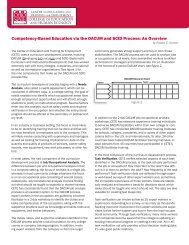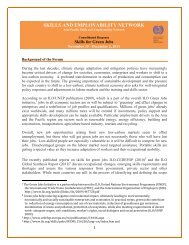FACTORS AFFECTING THE PERFORMANCE OF WOMEN ENTREPRENEURS IN MICRO ...
FACTORS AFFECTING THE PERFORMANCE OF WOMEN ENTREPRENEURS IN MICRO ...
FACTORS AFFECTING THE PERFORMANCE OF WOMEN ENTREPRENEURS IN MICRO ...
You also want an ePaper? Increase the reach of your titles
YUMPU automatically turns print PDFs into web optimized ePapers that Google loves.
2.2 Women entrepreneurship<br />
Women’s productive activities, particularly in industry, empower them economically and<br />
enable them to contribute more to overall development. Whether they are involved in<br />
small or medium scale production activities, or in the informal or formal sectors,<br />
women’s entrepreneurial activities are not only a means for economic survival but also<br />
have positive social repercussions for the women themselves and their social<br />
environment United Nations Industrial Development Organization (UNIDO, 2001).<br />
In many societies women do not enjoy the same opportunities as men. In many<br />
transitional economies progress has been achieved in opening doors to education and<br />
health protection for women but political and economic opportunities for female<br />
entrepreneurs have remained limited. Concerted efforts are needed to enable female<br />
entrepreneurs to make better economic choices and to transform their businesses into<br />
competitive enterprises, generating income and employment through improved<br />
production (OECD, 1997).<br />
2.2.1 Nature of women entrepreneurs<br />
There is no agreement among researchers with regard to the differences in the<br />
characteristics of male and female entrepreneurs. Some groups of researchers agree that<br />
there are no differences. But some others state differences. For example Green & Cohen<br />
(1995) stated,<br />
“An entrepreneur is an entrepreneur is an entrepreneur,” and it should not matter<br />
what size, shape, color, or sex the entrepreneur might be. If so, good research on<br />
entrepreneurs should generate theory applicable to all. While research shows<br />
similarities in the personal demographics of men and women entrepreneurs, there<br />
are differences in business and industry choices, financing strategies, growth<br />
patterns, and governance structures of female led ventures (p.106)<br />
These differences provide compelling reasons to study female entrepreneurship – looking<br />
specifically at women founders, their ventures, and their entrepreneurial behaviors as a<br />
unique subset of entrepreneurship. Just as we have found that clinical trials conducted on<br />
an all-male population do not necessarily provide accurate information about the<br />
diagnosis or treatment of female patients, we see that scholarly research focused only on<br />
14
















